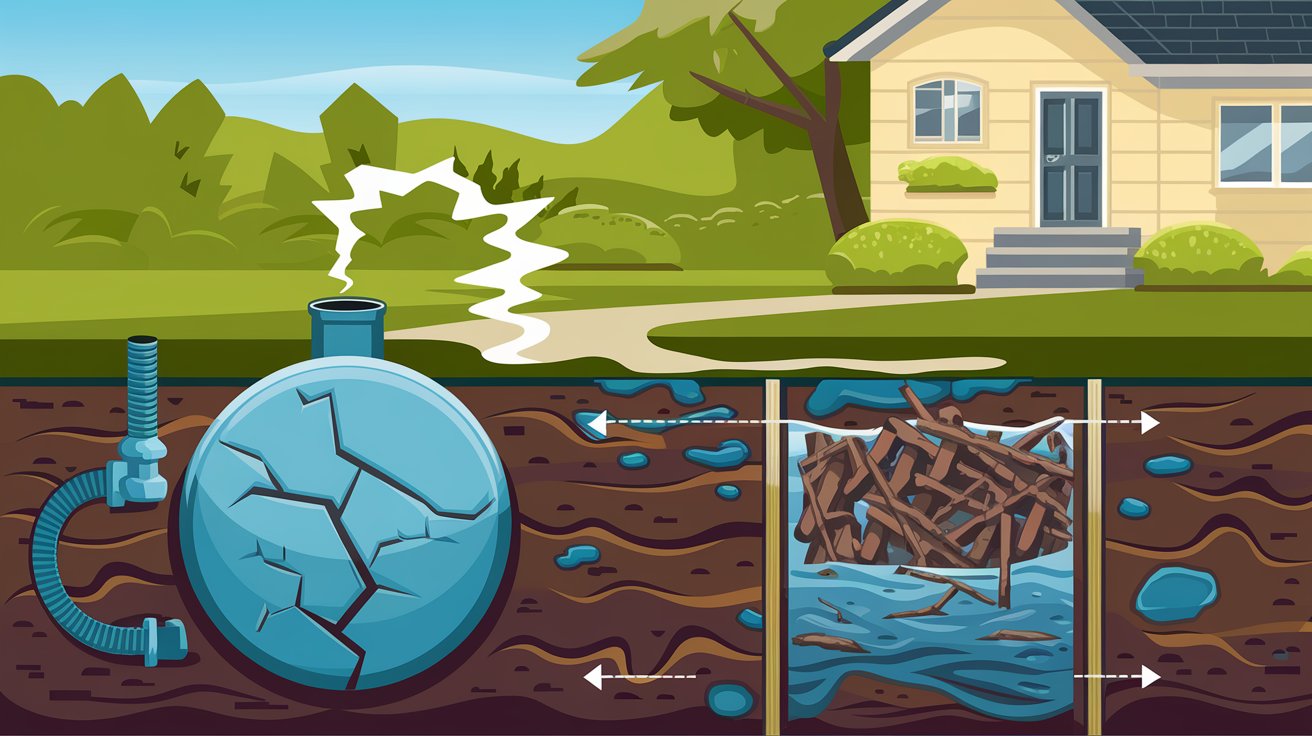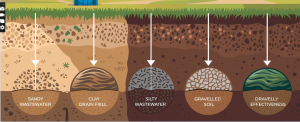Septic odors can be more than just an inconvenience; they often signal an underlying issue with your septic system. Septic odors, particularly those that linger near drains, toilets, or the yard, are unpleasant and can affect the comfort of your home. These odors are often caused by trapped gases or malfunctioning parts within the septic tank, but identifying the root cause can be tricky. This article will explore the common causes of septic odors, explain how to address them, and provide tips for preventing future problems, ensuring your septic system runs smoothly without those foul smells.
Table of Content
- What Are Septic Odors?
- Causes of Septic Odors
- How to Prevent Septic Odors
- When to Call a Professional
- FAQs about Common Causes of Septic Odors
- Septifix
- Septic Permit Links by State
What Are Septic Odors?
Septic odors are usually caused by gases produced during the breakdown of organic waste in your septic tank. Under normal conditions, the system is designed to manage these odors, but various factors can lead to their escape into your home or yard. Common septic odors include the smell of rotten eggs, caused by hydrogen sulfide, and sewage-like odors resulting from improperly treated wastewater. Identifying the cause of these odors is crucial, as they could be signs of a septic system failure, a blocked vent, or improper waste disposal.
Causes of Septic Odors
1. Clogged or Full Septic Tank
One of the most common causes of septic odors is a full or clogged septic tank. Over time, solid waste and sludge accumulate in the tank, which may eventually cause the system to overflow or back up, leading to unpleasant smells. A tank that has not been pumped in several years is particularly vulnerable to this issue. Without regular maintenance, the waste in the tank can become anaerobic, which leads to the production of foul-smelling gases like methane and hydrogen sulfide.
To avoid septic odors from a full tank, it is important to schedule regular septic tank pumping. Typically, septic tanks should be pumped every three to five years, but this depends on the size of the tank and the number of people using the system. A professional septic service can help assess when your tank needs to be pumped.
2. Broken or Blocked Vents
A blocked or damaged vent is another common cause of septic odors. Your septic system relies on vent pipes to allow gases produced by waste breakdown to escape into the atmosphere. When these vent pipes are blocked—by debris, vegetation, or damage—the gases are trapped inside the system, causing odors to escape through drains, toilets, or even from the ground around the septic tank.
To prevent odors caused by blocked vents, regular inspection and maintenance of vent pipes are essential. Check for visible blockages, such as leaves or twigs, and ensure that the vents are clear of obstructions. If you suspect damage to your vent pipes, contact a professional plumber or septic service to inspect and repair them.
3. Leaky or Broken Pipes
Damaged pipes, whether in the septic tank or in the lines leading to the drain field, can result in septic odors. Cracked, leaky, or broken pipes allow untreated wastewater to escape and seep into the soil, creating unpleasant odors in your yard and sometimes inside the house. If you notice wet spots or an increase in the smell of sewage around your property, it could be a sign of a pipe leak or break.
To resolve this issue, a professional should conduct a thorough inspection of your septic system’s pipes. Advanced tools, like video inspections, can be used to locate hidden leaks or damage. Prompt repairs will prevent further odor issues and potential contamination of your yard and groundwater.
4. Inadequate Drain Field
A failing drain field is another major contributor to septic odors. The drain field (also known as a leach field) is responsible for filtering and dispersing wastewater into the soil. When the drain field becomes saturated, clogged, or damaged, the wastewater cannot be adequately filtered, causing it to pool or rise to the surface, emitting foul odors. A saturated drain field can also lead to a slow-moving or backed-up septic system, which exacerbates the problem.
Signs that your drain field may be failing include pooling water or soggy patches in your yard, persistent sewage odors, or slow draining from sinks, toilets, and tubs. If you suspect drain field issues, it’s best to consult a professional for an assessment. In some cases, drain field repairs or replacement may be necessary.
5. Bacterial Imbalance in the Tank
The beneficial bacteria in a septic tank play a crucial role in breaking down waste and keeping the system functioning properly. When the balance of bacteria is disrupted—often due to excessive chemical usage, non-biodegradable items being flushed, or neglect—decomposition slows down, and odors are produced as a result. An imbalance in the bacteria can lead to an anaerobic environment, where smelly gases like methane and sulfur are released into the system and, eventually, into your home.
To restore the bacterial balance, it’s important to use only septic-safe products and avoid flushing non-biodegradable items. Some homeowners may also consider adding septic tank additives designed to promote healthy bacterial activity. However, it is important to consult a professional before using additives, as they can sometimes cause more harm than good.
How to Prevent Septic Odors
Regular Tank Pumping
One of the best ways to prevent septic odors is by ensuring your septic tank is pumped on a regular basis. This helps to remove accumulated sludge and solid waste, preventing the tank from overflowing and releasing foul odors. Regular pumping also allows a professional to inspect the system for potential issues.
Proper Waste Disposal
Proper waste disposal is key to preventing septic odors. Never flush non-biodegradable items, such as wipes, sanitary products, or oils, down the toilet or drain. These items can clog the system and disrupt the natural breakdown process, leading to blockages and odors. Additionally, avoid pouring chemicals like bleach or grease down the drains, as they can kill beneficial bacteria in the septic tank.
Vent Pipe Maintenance
Regularly inspect your septic system’s vent pipes to ensure they are clear of obstructions. Keep the area around the vents free of debris and trim back vegetation that could block airflow. If you notice slow drainage or persistent odors near vents, check for blockages or cracks and address them promptly.
Drain Field Care
Proper maintenance of your drain field is essential for avoiding odors. Avoid parking cars or placing heavy structures on top of your drain field, as this can damage the pipes and prevent proper drainage. Additionally, ensure the area around the drain field is kept clear of vegetation that could impede wastewater filtration.
When to Call a Professional
While there are many steps you can take to prevent and mitigate septic odors, there are times when professional help is necessary. If you experience persistent odors despite regular maintenance, or if you notice signs of a septic system failure, it’s time to call a septic service. Ignoring the problem can lead to more severe issues, including system backups or contamination of your yard and groundwater.
Conclusion
Septic odors are more than just an unpleasant nuisance—they can indicate significant issues within your septic system. Common causes of septic odors include a full tank, broken vents, damaged pipes, a failing drain field, and bacterial imbalance. By understanding these causes and taking proactive steps like regular pumping, proper waste disposal, and vent maintenance, you can prevent unpleasant odors and keep your septic system functioning efficiently.
If you’re dealing with persistent septic odors, don’t hesitate to call in a professional to address the issue before it worsens. For more information on septic tank maintenance, check out our expert product reviews and services for solutions that keep your septic system odor-free.

FAQs about Common Causes of Septic Odors
What is the most common cause of septic odors?
The most common cause of septic odors is a full or clogged septic tank. When a septic tank is full and hasn’t been pumped in a while, waste and sludge can accumulate, causing gases like methane and hydrogen sulfide to escape. Regular pumping of your septic tank every three to five years can help prevent this issue.
Why do I smell septic odors near my drains?
If you notice septic odors near your drains, the cause could be a blocked or damaged vent pipe. Septic systems rely on vent pipes to allow gases to escape safely. When these vents become blocked by debris or vegetation, gases build up inside, leading to odors escaping through the drains. Ensure vent pipes are clear to avoid this issue.
Can a leaky pipe cause septic odors?
Yes, leaky or broken pipes are a significant cause of septic odors. If the pipes in your septic system are cracked or leaking, untreated wastewater may seep out into your yard or home, producing foul smells. Regular inspections can help detect leaks early, and professional repairs can prevent further damage and odors.
How do I know if my drain field is causing septic odors?
If your drain field is failing, you may notice puddles of water or soggy spots in your yard, especially in the area above the drain field. Additionally, you may experience slow drainage in your sinks, toilets, or bathtubs. If these symptoms are present, contact a professional to inspect your drain field and determine if repairs or replacement are needed.
What role does bacteria play in septic odors?
Healthy bacteria in your septic tank help break down waste and prevent odors. If the balance of bacteria is disrupted—due to the use of harsh chemicals or flushing inappropriate items—it can lead to an anaerobic environment, causing foul-smelling gases to build up. Maintaining a proper bacterial balance is key to preventing septic odors. You can encourage healthy bacteria by using septic-safe products and avoiding chemical cleaners.
How can I prevent septic odors in the future?
To prevent septic odors, make sure to pump your septic tank regularly, avoid flushing non-biodegradable items, maintain clear vent pipes, and ensure your drain field is well-kept. Regular maintenance and responsible waste disposal are the best ways to keep your septic system odor-free.
Should I use septic tank additives to prevent odors?
While some people use septic tank additives to help break down waste and maintain bacterial balance, it’s important to consult a professional before using them. Some additives can cause more harm than good, and relying on them alone will not fix the underlying issues of your septic system. Proper maintenance, like regular pumping and responsible waste disposal, is more effective in preventing odors.
When should I call a professional for septic odors?
If you notice persistent septic odors despite regular maintenance or if you see signs of a septic system failure—such as slow drainage, pooling water, or sewage smells—it’s time to call a professional. A septic system expert can inspect your system and address any problems before they become more serious.
What Types of Regional Soil Work Best for Septic Systems?
Septic Tanks in Rural Areas: A Practical Guide for Homeowners
Directory | Wyoming Septic Service Providers : Best Professionals
Directory | Wisconsin Septic Service Providers | Part 3
Directory | Wisconsin Septic Service Providers | Part 2
Directory | Wisconsin Septic Service Providers | Part 1
Directory | West Virginia Septic Service Providers : Best Professionals
Winter Pumping: Should You or Shouldn’t You?
Septifix










